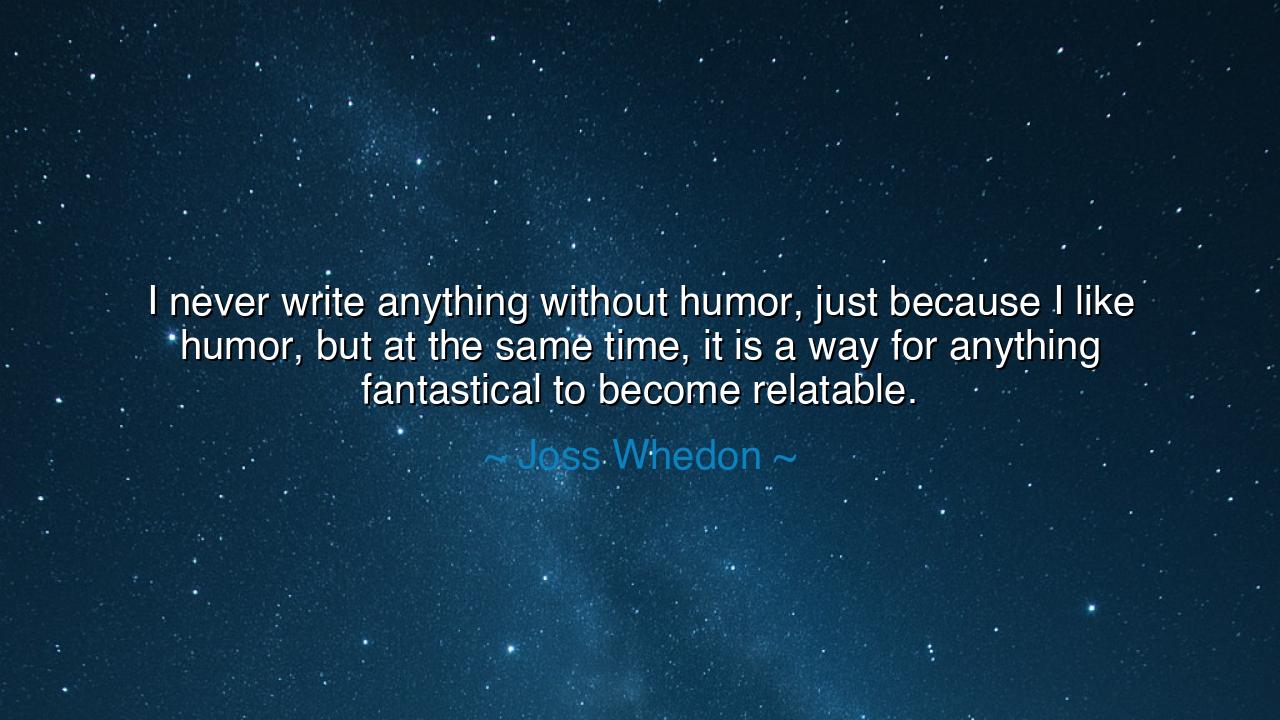
I never write anything without humor, just because I like humor
I never write anything without humor, just because I like humor, but at the same time, it is a way for anything fantastical to become relatable.






In the words of Joss Whedon, “I never write anything without humor, just because I like humor, but at the same time, it is a way for anything fantastical to become relatable.”
Within this humble confession lies a truth as ancient as storytelling itself — that humor is not merely entertainment, but a bridge between the extraordinary and the human heart. Whedon, the weaver of worlds where gods and mortals walk side by side, reveals that laughter is not a decoration upon his art, but its foundation. For even when the tale is filled with fantasy, when its heroes battle demons or fly among stars, it is humor that keeps the soul of the story grounded, reminding us that the miraculous still belongs to us.
The origin of this wisdom can be traced to the dawn of myth itself. When the ancients told their tales of gods and heroes — of Zeus hurling thunder, of Hercules wrestling monsters — they did not speak in solemn tones alone. The bards and dramatists understood that even the divine must sometimes stumble, jest, or err, for it is through imperfection that the listener sees their own reflection. The mighty Homer, in his Odyssey, allowed his hero to laugh, to boast foolishly, to weep, and to jest. In these moments, Odysseus was not a legend but a man — and thus, his struggle became our own. Whedon’s use of humor follows this ancient lineage: it gives life to the impossible, warmth to the cold stars, and humanity to the gods of fiction.
To write with humor is to acknowledge that life itself, though filled with tragedy and grandeur, is always tinged with absurdity. It is to see that beneath the battles and heartbreak, beneath the hero’s journey and the villain’s fall, there beats the rhythm of laughter — the heartbeat of existence. Whedon’s insight that humor makes the fantastical relatable is a revelation that laughter is not the opposite of seriousness, but its companion. Where solemnity isolates, humor unites; where spectacle alienates, humor draws near. It reminds us that even amid the miraculous, people still trip, hope, love, and make mistakes.
Consider the tale of Shakespeare, who, like Whedon, built his worlds upon this balance. In his grandest tragedies — Hamlet, Macbeth, King Lear — he did not banish laughter. The fool walks beside the king, jesting in the shadow of doom. Why? Because humor reveals the truth that tragedy and comedy are not opposites, but twins — both born of the same fragile understanding that we are mortal. The laughter of the fool does not mock sorrow; it gives it meaning. So too does Whedon’s humor breathe life into fantasy, turning distant heroes into companions of the soul.
In the modern age, where art often seeks to dazzle rather than connect, Whedon’s philosophy stands as a quiet rebellion. His humor is not sarcasm for its own sake, but humanity speaking through myth. When his characters crack jokes amid danger or grief, they remind us of ourselves — that even when faced with darkness, we reach for light. The humor does not diminish the peril; it magnifies the courage. It tells us that the truest strength lies not in invulnerability, but in endurance — in the ability to laugh, even when the storm has not yet passed.
Thus, the lesson of his words is profound: do not separate wonder from warmth. Whether you tell stories, lead others, or simply live your days, remember that humor is the thread that ties the grand to the real. If you wish your dreams to reach others, let them laugh with you. If you wish your ideas to endure, let them be human. Laughter does not cheapen meaning — it reveals it. For through humor, we learn to see ourselves not as gods nor fools, but as both — beings of starlight and dust, forever caught between the sublime and the ridiculous.
Let this, then, be the teaching to carry forth: never create, speak, or live without humor. Let it temper your pride and heal your sorrow. Let it make your struggles relatable and your victories gracious. When you face the fantastical trials of life — its chaos, its beauty, its impossible scale — remember to smile. For as Joss Whedon reminds us, humor is not the escape from reality; it is the doorway through which the impossible becomes real, and through which the human heart learns, at last, to find itself among the stars.






AAdministratorAdministrator
Welcome, honored guests. Please leave a comment, we will respond soon